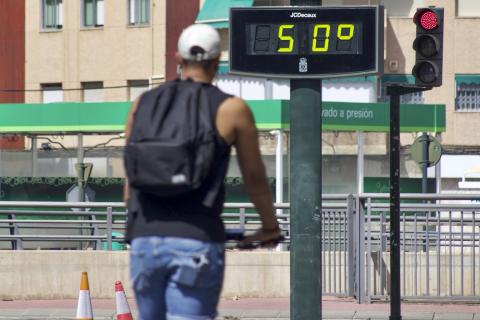Reactions to the "exceptionally high" temperatures expected in Spain over the next few days
The State Meteorological Agency (AEMET) has issued an information note warning of "exceptionally high" temperatures for this time of year in Spain, especially between Friday 29 September and Monday 2 October.

José Miguel Viñas - calor en otoño EN
José Miguel Viñas
Meteorologist at Meteored at www.tiempo.com and consultant for the WMO (Spain)
An intensification of heat is forecast from the weekend onwards which could lead to some record high temperatures for September and October. While there are precedents for heat of a similar order of magnitude in other early autumns, there has been a significant concentration in recent years.
We are witnessing a transition in which what was exceptional until not so long ago is becoming commonplace. This is the new climatic reality. The number of hot days is increasing, with more and more of them occurring in spring and autumn, which has the effect of lengthening the summer weather. In the past there have always been hot spells in both spring and autumn, but not with the frequency and magnitude that we are experiencing today.
We need to adapt quickly to this new climate framework. High temperatures have a direct and negative impact on health, in addition to the dangers posed by extreme weather events, which we see are becoming more intense. We are vulnerable to them and need to take protective measures, starting with prevention. Beyond this, to avoid the worst-case scenarios of climate projections, we must urgently reduce emissions of greenhouse gases into the atmosphere from the burning of fossil fuels. This must be done decisively and on a global scale, which means profoundly changing the unsustainable model of society we have been creating. It is a difficult challenge, but not an impossible one.
Rubén del Campo - calor otoño EN
Rubén del Campo
Spokesperson of the State Meteorological Agency (AEMET)
With the predicted data, these temperatures are unprecedented at least since 1950, which is the date from which we have data to make these analyses.
This episode is absolutely extraordinary, since we are talking about maximum temperatures typical of the month of August in a large part of the Spanish mainland and also in the Canary Islands. Although this is an extraordinary episode, the frequency of these episodes of very high temperatures for this time of year is increasing. In fact, this past April we also had a situation of mid-summer temperatures in Spain, reaching 38.8 ºC in Cordoba, beating the previous record by almost five degrees. And we have many more examples of unprecedented warm spells for the time of year: the summer of 2022 itself and even the autumn of 2022 and winter of 2023 were together the warmest in the historical series.
It cannot be said that these episodes of extreme and seasonally high temperatures will be common, but they will become more frequent. If we analyse the records for hot and cold days in Spain, i.e. those days that have broken temperature records for that specific date in our country, we see that in 2022 there were 35 records for hot days and two for cold days. In a climate without the influence of anthropogenic climate change, five records for each would be expected. In 2023, if the forecasts come true, we are likely to have 25 record warm days and no record cold days. The disproportion is therefore clear and most certainly a consequence of anthropogenic climate change.
This particular episode of high temperatures occurs at the end of September and beginning of October, and will not cause the deaths that heat waves cause in the middle of summer. However, the risk of fires will increase, especially in the northern third of the peninsula. Moreover, this heat is accompanied by a lack of rain. September has been a very rainy month, but the drought is not over and the water in reservoirs will not recover in the coming days. As for extreme events in general, they are going to be costly in terms of material damage and also, unfortunately, in terms of human lives.
To minimise the consequences, we must adapt to this new climate in our country. We already know that summers are longer, that we have longer and more intense heat waves and we have to be aware of this. We must also take into account that we are going to live in a country with fewer water resources in the coming decades, because it is going to be a country with longer and more intense periods of drought interrupted by periods of rain that may be more torrential and less "usable". We should probably adapt the demand for water to the existing supply and not the other way around.
In addition, mitigation is something that all countries should be responsible for. We know that anthropogenic climate change is mainly caused by the emission of greenhouse gases associated with our activities, and a reduction of these emissions would help to avoid exceeding certain thresholds. The IPCC sets 1.5°C warmer than in industrial times as a safety threshold, a threshold that if exceeded can exacerbate the worst effects of climate change.
Declara no tener conflictos de interés, más allá de ser trabajador y portavoz de AEMET, agencia que emite la nota informativa.



